University Sociology Research Report: Spiritual Care Volunteers
VerifiedAdded on 2022/10/01
|7
|2029
|146
Report
AI Summary
This research report, focusing on a sociology perspective, investigates the impact of spiritual care workers in hospitals. It analyzes the crucial role these volunteers play in patient wellbeing, especially in addressing psychological issues like depression and anxiety. The report highlights the importance of distinguishing between religion and spirituality and examines the current state of spiritual care services in hospitals, noting perceptual gaps and a lack of awareness. Recommendations include online and offline campaigns to clarify the difference between religion and spirituality, and increased collaboration between healthcare staff and spiritual volunteers. The report emphasizes the need for governmental support through awareness programs and contracts with healthcare organizations to promote spiritual services, ultimately aiming to enhance the holistic care provided to patients and improve the support available to spiritual care workers. The research includes a comprehensive literature review with references in APA style to support the findings and recommendations.
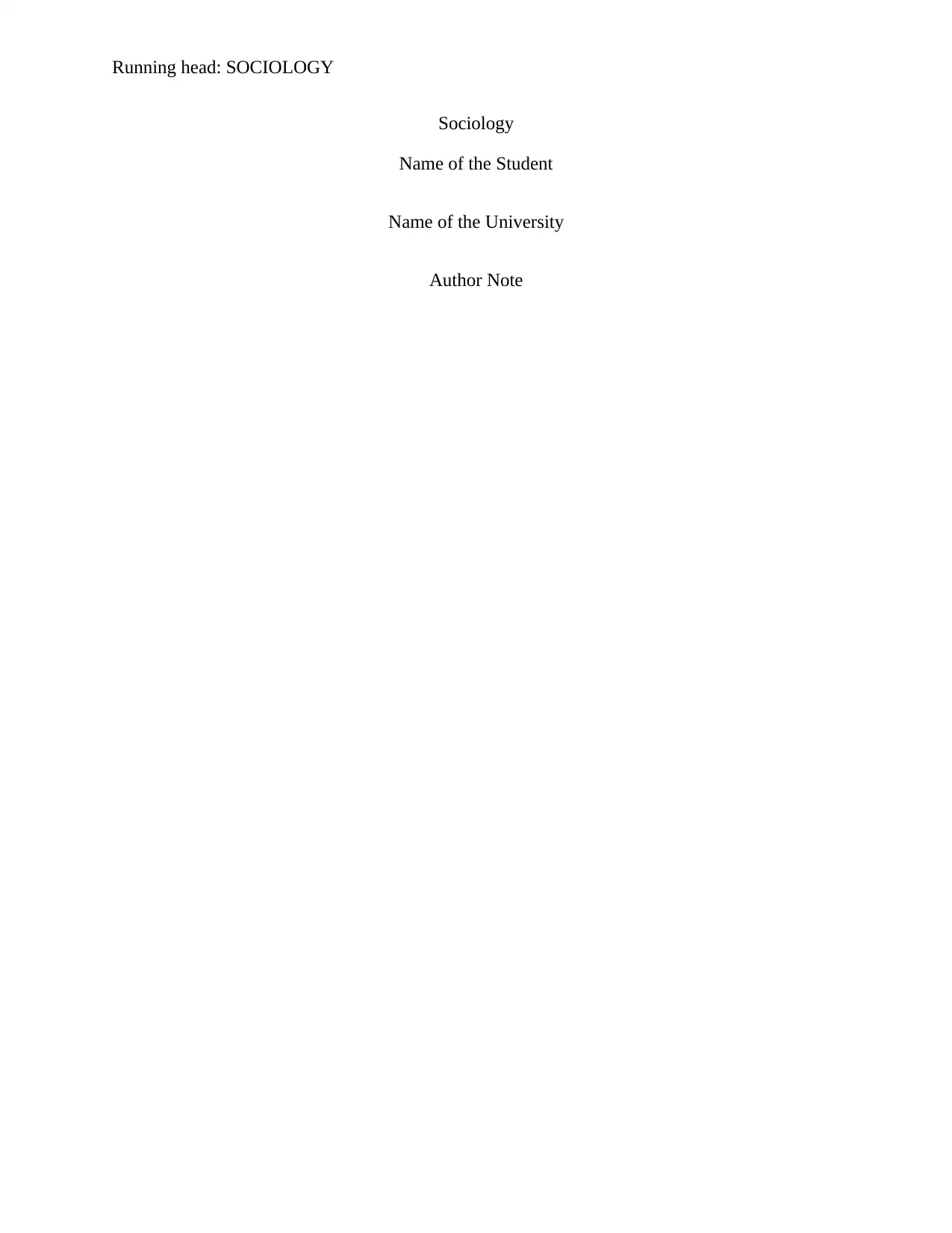
Running head: SOCIOLOGY
Sociology
Name of the Student
Name of the University
Author Note
Sociology
Name of the Student
Name of the University
Author Note
Paraphrase This Document
Need a fresh take? Get an instant paraphrase of this document with our AI Paraphraser
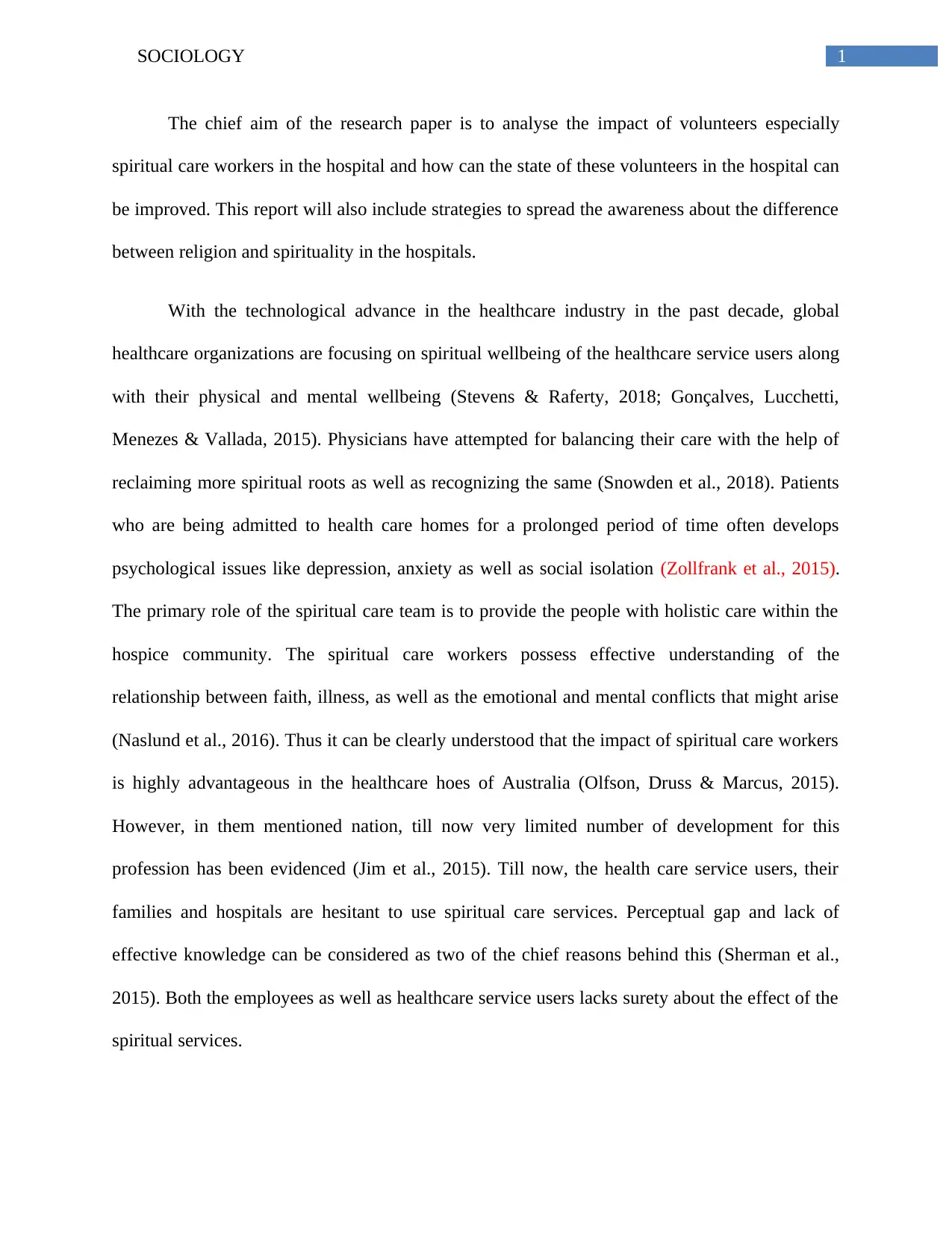
1SOCIOLOGY
The chief aim of the research paper is to analyse the impact of volunteers especially
spiritual care workers in the hospital and how can the state of these volunteers in the hospital can
be improved. This report will also include strategies to spread the awareness about the difference
between religion and spirituality in the hospitals.
With the technological advance in the healthcare industry in the past decade, global
healthcare organizations are focusing on spiritual wellbeing of the healthcare service users along
with their physical and mental wellbeing (Stevens & Raferty, 2018; Gonçalves, Lucchetti,
Menezes & Vallada, 2015). Physicians have attempted for balancing their care with the help of
reclaiming more spiritual roots as well as recognizing the same (Snowden et al., 2018). Patients
who are being admitted to health care homes for a prolonged period of time often develops
psychological issues like depression, anxiety as well as social isolation (Zollfrank et al., 2015).
The primary role of the spiritual care team is to provide the people with holistic care within the
hospice community. The spiritual care workers possess effective understanding of the
relationship between faith, illness, as well as the emotional and mental conflicts that might arise
(Naslund et al., 2016). Thus it can be clearly understood that the impact of spiritual care workers
is highly advantageous in the healthcare hoes of Australia (Olfson, Druss & Marcus, 2015).
However, in them mentioned nation, till now very limited number of development for this
profession has been evidenced (Jim et al., 2015). Till now, the health care service users, their
families and hospitals are hesitant to use spiritual care services. Perceptual gap and lack of
effective knowledge can be considered as two of the chief reasons behind this (Sherman et al.,
2015). Both the employees as well as healthcare service users lacks surety about the effect of the
spiritual services.
The chief aim of the research paper is to analyse the impact of volunteers especially
spiritual care workers in the hospital and how can the state of these volunteers in the hospital can
be improved. This report will also include strategies to spread the awareness about the difference
between religion and spirituality in the hospitals.
With the technological advance in the healthcare industry in the past decade, global
healthcare organizations are focusing on spiritual wellbeing of the healthcare service users along
with their physical and mental wellbeing (Stevens & Raferty, 2018; Gonçalves, Lucchetti,
Menezes & Vallada, 2015). Physicians have attempted for balancing their care with the help of
reclaiming more spiritual roots as well as recognizing the same (Snowden et al., 2018). Patients
who are being admitted to health care homes for a prolonged period of time often develops
psychological issues like depression, anxiety as well as social isolation (Zollfrank et al., 2015).
The primary role of the spiritual care team is to provide the people with holistic care within the
hospice community. The spiritual care workers possess effective understanding of the
relationship between faith, illness, as well as the emotional and mental conflicts that might arise
(Naslund et al., 2016). Thus it can be clearly understood that the impact of spiritual care workers
is highly advantageous in the healthcare hoes of Australia (Olfson, Druss & Marcus, 2015).
However, in them mentioned nation, till now very limited number of development for this
profession has been evidenced (Jim et al., 2015). Till now, the health care service users, their
families and hospitals are hesitant to use spiritual care services. Perceptual gap and lack of
effective knowledge can be considered as two of the chief reasons behind this (Sherman et al.,
2015). Both the employees as well as healthcare service users lacks surety about the effect of the
spiritual services.
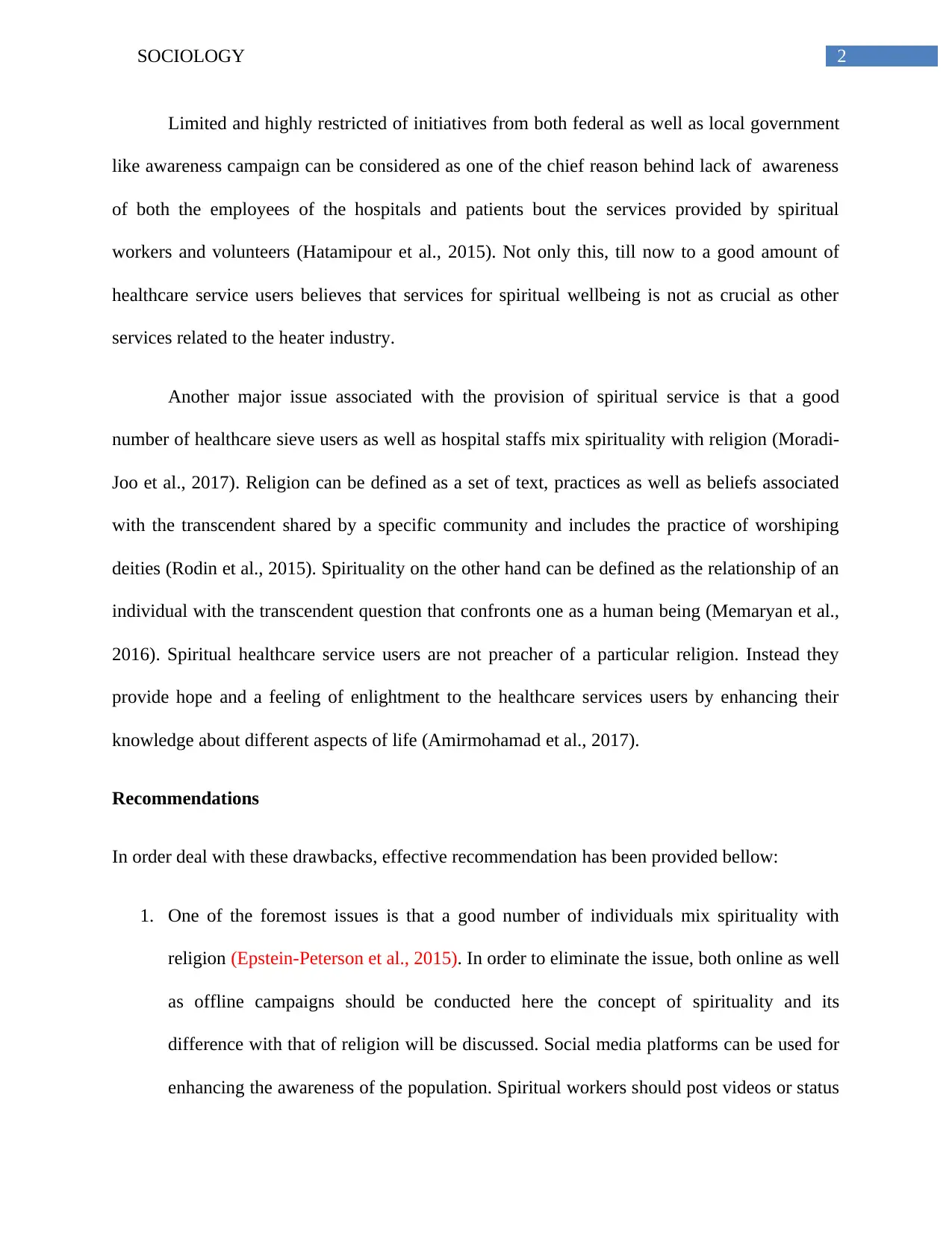
2SOCIOLOGY
Limited and highly restricted of initiatives from both federal as well as local government
like awareness campaign can be considered as one of the chief reason behind lack of awareness
of both the employees of the hospitals and patients bout the services provided by spiritual
workers and volunteers (Hatamipour et al., 2015). Not only this, till now to a good amount of
healthcare service users believes that services for spiritual wellbeing is not as crucial as other
services related to the heater industry.
Another major issue associated with the provision of spiritual service is that a good
number of healthcare sieve users as well as hospital staffs mix spirituality with religion (Moradi-
Joo et al., 2017). Religion can be defined as a set of text, practices as well as beliefs associated
with the transcendent shared by a specific community and includes the practice of worshiping
deities (Rodin et al., 2015). Spirituality on the other hand can be defined as the relationship of an
individual with the transcendent question that confronts one as a human being (Memaryan et al.,
2016). Spiritual healthcare service users are not preacher of a particular religion. Instead they
provide hope and a feeling of enlightment to the healthcare services users by enhancing their
knowledge about different aspects of life (Amirmohamad et al., 2017).
Recommendations
In order deal with these drawbacks, effective recommendation has been provided bellow:
1. One of the foremost issues is that a good number of individuals mix spirituality with
religion (Epstein-Peterson et al., 2015). In order to eliminate the issue, both online as well
as offline campaigns should be conducted here the concept of spirituality and its
difference with that of religion will be discussed. Social media platforms can be used for
enhancing the awareness of the population. Spiritual workers should post videos or status
Limited and highly restricted of initiatives from both federal as well as local government
like awareness campaign can be considered as one of the chief reason behind lack of awareness
of both the employees of the hospitals and patients bout the services provided by spiritual
workers and volunteers (Hatamipour et al., 2015). Not only this, till now to a good amount of
healthcare service users believes that services for spiritual wellbeing is not as crucial as other
services related to the heater industry.
Another major issue associated with the provision of spiritual service is that a good
number of healthcare sieve users as well as hospital staffs mix spirituality with religion (Moradi-
Joo et al., 2017). Religion can be defined as a set of text, practices as well as beliefs associated
with the transcendent shared by a specific community and includes the practice of worshiping
deities (Rodin et al., 2015). Spirituality on the other hand can be defined as the relationship of an
individual with the transcendent question that confronts one as a human being (Memaryan et al.,
2016). Spiritual healthcare service users are not preacher of a particular religion. Instead they
provide hope and a feeling of enlightment to the healthcare services users by enhancing their
knowledge about different aspects of life (Amirmohamad et al., 2017).
Recommendations
In order deal with these drawbacks, effective recommendation has been provided bellow:
1. One of the foremost issues is that a good number of individuals mix spirituality with
religion (Epstein-Peterson et al., 2015). In order to eliminate the issue, both online as well
as offline campaigns should be conducted here the concept of spirituality and its
difference with that of religion will be discussed. Social media platforms can be used for
enhancing the awareness of the population. Spiritual workers should post videos or status
⊘ This is a preview!⊘
Do you want full access?
Subscribe today to unlock all pages.

Trusted by 1+ million students worldwide
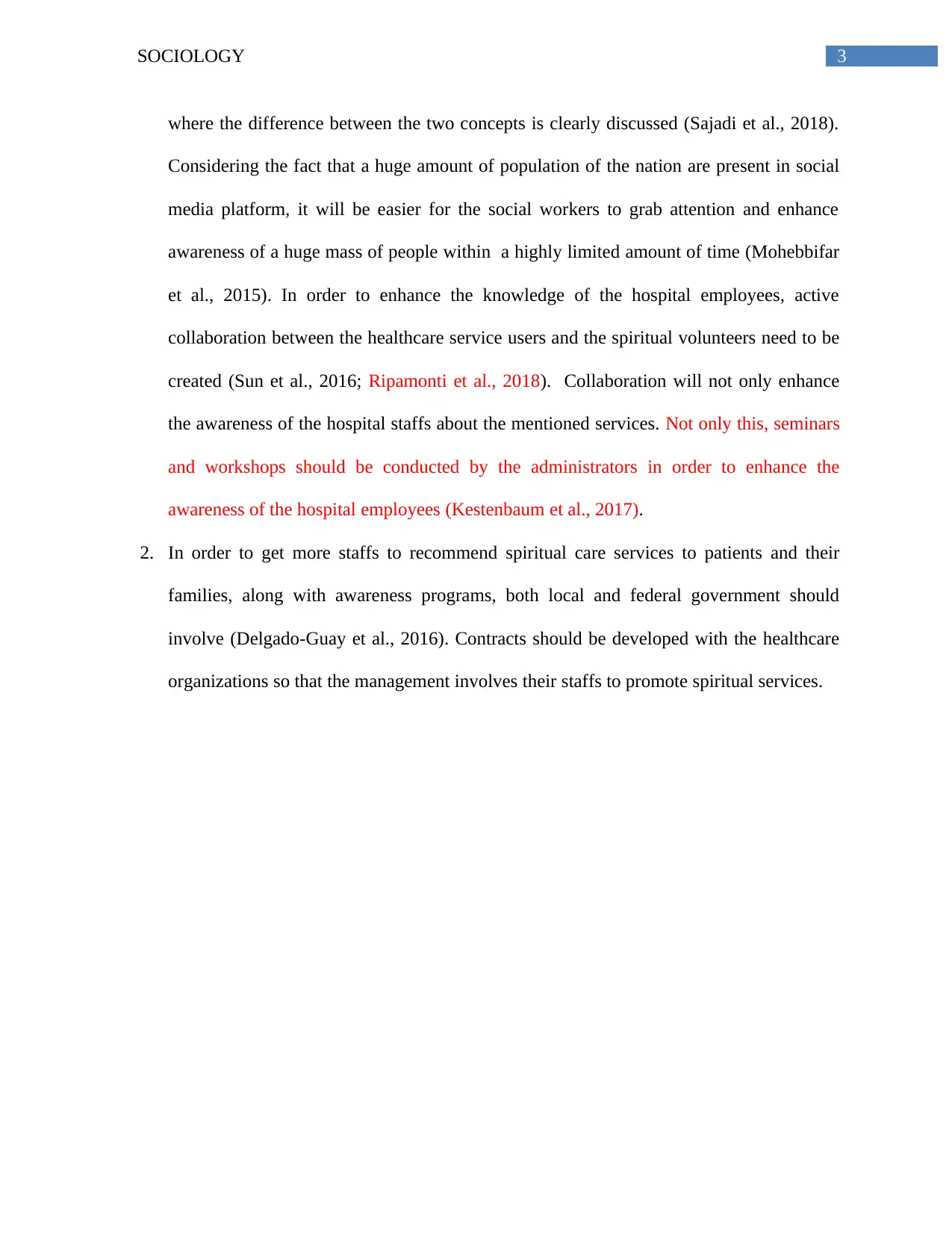
3SOCIOLOGY
where the difference between the two concepts is clearly discussed (Sajadi et al., 2018).
Considering the fact that a huge amount of population of the nation are present in social
media platform, it will be easier for the social workers to grab attention and enhance
awareness of a huge mass of people within a highly limited amount of time (Mohebbifar
et al., 2015). In order to enhance the knowledge of the hospital employees, active
collaboration between the healthcare service users and the spiritual volunteers need to be
created (Sun et al., 2016; Ripamonti et al., 2018). Collaboration will not only enhance
the awareness of the hospital staffs about the mentioned services. Not only this, seminars
and workshops should be conducted by the administrators in order to enhance the
awareness of the hospital employees (Kestenbaum et al., 2017).
2. In order to get more staffs to recommend spiritual care services to patients and their
families, along with awareness programs, both local and federal government should
involve (Delgado-Guay et al., 2016). Contracts should be developed with the healthcare
organizations so that the management involves their staffs to promote spiritual services.
where the difference between the two concepts is clearly discussed (Sajadi et al., 2018).
Considering the fact that a huge amount of population of the nation are present in social
media platform, it will be easier for the social workers to grab attention and enhance
awareness of a huge mass of people within a highly limited amount of time (Mohebbifar
et al., 2015). In order to enhance the knowledge of the hospital employees, active
collaboration between the healthcare service users and the spiritual volunteers need to be
created (Sun et al., 2016; Ripamonti et al., 2018). Collaboration will not only enhance
the awareness of the hospital staffs about the mentioned services. Not only this, seminars
and workshops should be conducted by the administrators in order to enhance the
awareness of the hospital employees (Kestenbaum et al., 2017).
2. In order to get more staffs to recommend spiritual care services to patients and their
families, along with awareness programs, both local and federal government should
involve (Delgado-Guay et al., 2016). Contracts should be developed with the healthcare
organizations so that the management involves their staffs to promote spiritual services.
Paraphrase This Document
Need a fresh take? Get an instant paraphrase of this document with our AI Paraphraser
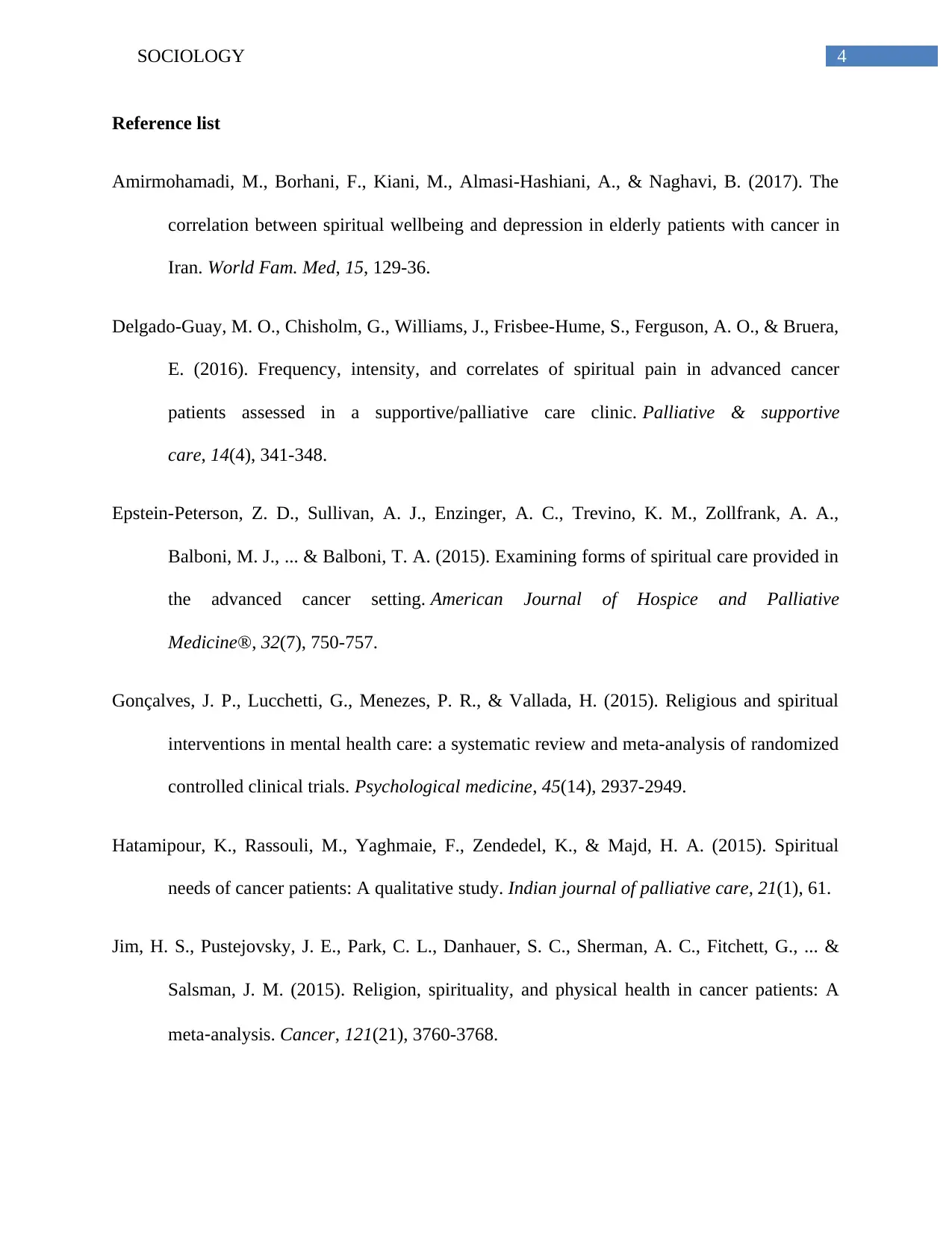
4SOCIOLOGY
Reference list
Amirmohamadi, M., Borhani, F., Kiani, M., Almasi-Hashiani, A., & Naghavi, B. (2017). The
correlation between spiritual wellbeing and depression in elderly patients with cancer in
Iran. World Fam. Med, 15, 129-36.
Delgado-Guay, M. O., Chisholm, G., Williams, J., Frisbee-Hume, S., Ferguson, A. O., & Bruera,
E. (2016). Frequency, intensity, and correlates of spiritual pain in advanced cancer
patients assessed in a supportive/palliative care clinic. Palliative & supportive
care, 14(4), 341-348.
Epstein-Peterson, Z. D., Sullivan, A. J., Enzinger, A. C., Trevino, K. M., Zollfrank, A. A.,
Balboni, M. J., ... & Balboni, T. A. (2015). Examining forms of spiritual care provided in
the advanced cancer setting. American Journal of Hospice and Palliative
Medicine®, 32(7), 750-757.
Gonçalves, J. P., Lucchetti, G., Menezes, P. R., & Vallada, H. (2015). Religious and spiritual
interventions in mental health care: a systematic review and meta-analysis of randomized
controlled clinical trials. Psychological medicine, 45(14), 2937-2949.
Hatamipour, K., Rassouli, M., Yaghmaie, F., Zendedel, K., & Majd, H. A. (2015). Spiritual
needs of cancer patients: A qualitative study. Indian journal of palliative care, 21(1), 61.
Jim, H. S., Pustejovsky, J. E., Park, C. L., Danhauer, S. C., Sherman, A. C., Fitchett, G., ... &
Salsman, J. M. (2015). Religion, spirituality, and physical health in cancer patients: A
meta‐analysis. Cancer, 121(21), 3760-3768.
Reference list
Amirmohamadi, M., Borhani, F., Kiani, M., Almasi-Hashiani, A., & Naghavi, B. (2017). The
correlation between spiritual wellbeing and depression in elderly patients with cancer in
Iran. World Fam. Med, 15, 129-36.
Delgado-Guay, M. O., Chisholm, G., Williams, J., Frisbee-Hume, S., Ferguson, A. O., & Bruera,
E. (2016). Frequency, intensity, and correlates of spiritual pain in advanced cancer
patients assessed in a supportive/palliative care clinic. Palliative & supportive
care, 14(4), 341-348.
Epstein-Peterson, Z. D., Sullivan, A. J., Enzinger, A. C., Trevino, K. M., Zollfrank, A. A.,
Balboni, M. J., ... & Balboni, T. A. (2015). Examining forms of spiritual care provided in
the advanced cancer setting. American Journal of Hospice and Palliative
Medicine®, 32(7), 750-757.
Gonçalves, J. P., Lucchetti, G., Menezes, P. R., & Vallada, H. (2015). Religious and spiritual
interventions in mental health care: a systematic review and meta-analysis of randomized
controlled clinical trials. Psychological medicine, 45(14), 2937-2949.
Hatamipour, K., Rassouli, M., Yaghmaie, F., Zendedel, K., & Majd, H. A. (2015). Spiritual
needs of cancer patients: A qualitative study. Indian journal of palliative care, 21(1), 61.
Jim, H. S., Pustejovsky, J. E., Park, C. L., Danhauer, S. C., Sherman, A. C., Fitchett, G., ... &
Salsman, J. M. (2015). Religion, spirituality, and physical health in cancer patients: A
meta‐analysis. Cancer, 121(21), 3760-3768.
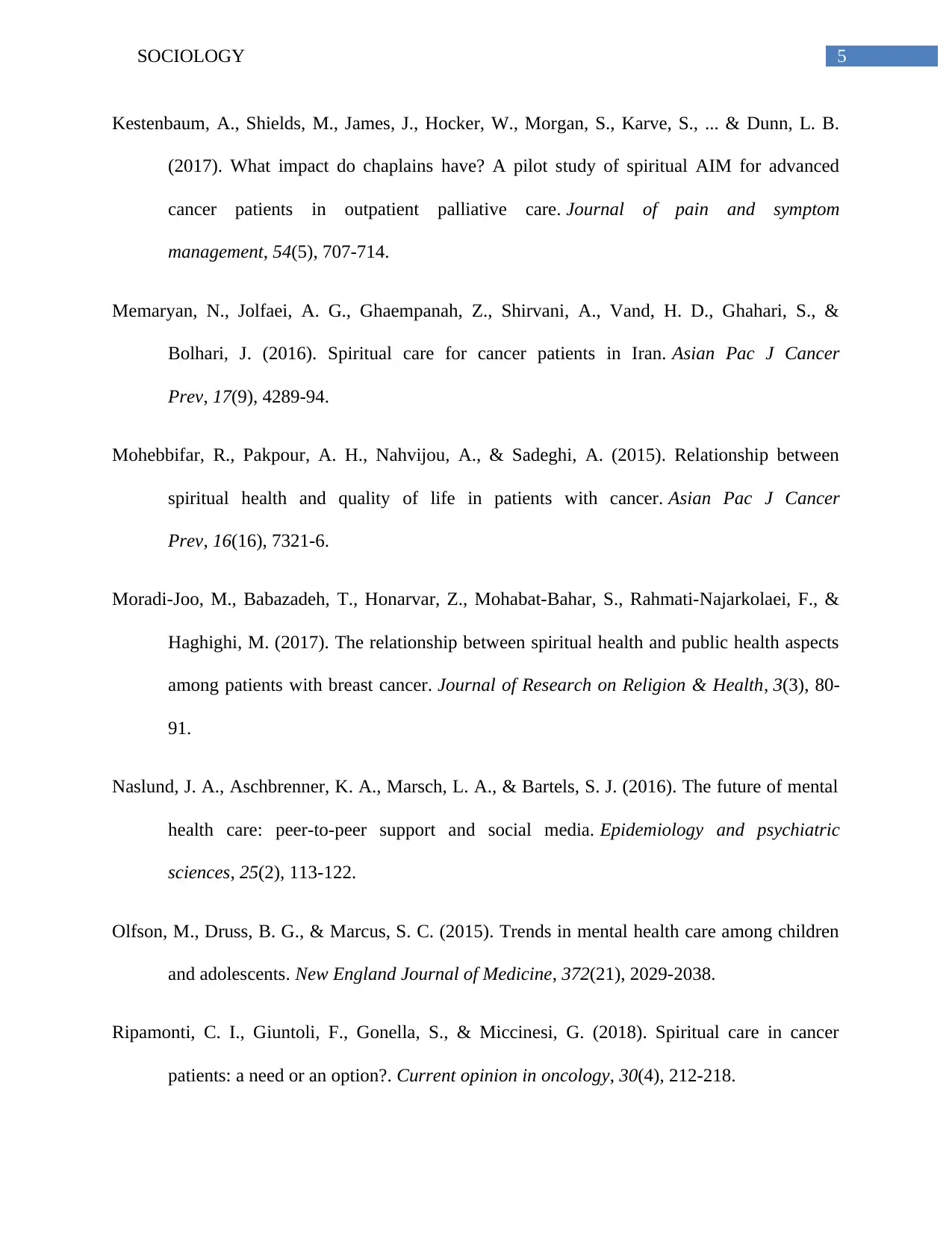
5SOCIOLOGY
Kestenbaum, A., Shields, M., James, J., Hocker, W., Morgan, S., Karve, S., ... & Dunn, L. B.
(2017). What impact do chaplains have? A pilot study of spiritual AIM for advanced
cancer patients in outpatient palliative care. Journal of pain and symptom
management, 54(5), 707-714.
Memaryan, N., Jolfaei, A. G., Ghaempanah, Z., Shirvani, A., Vand, H. D., Ghahari, S., &
Bolhari, J. (2016). Spiritual care for cancer patients in Iran. Asian Pac J Cancer
Prev, 17(9), 4289-94.
Mohebbifar, R., Pakpour, A. H., Nahvijou, A., & Sadeghi, A. (2015). Relationship between
spiritual health and quality of life in patients with cancer. Asian Pac J Cancer
Prev, 16(16), 7321-6.
Moradi-Joo, M., Babazadeh, T., Honarvar, Z., Mohabat-Bahar, S., Rahmati-Najarkolaei, F., &
Haghighi, M. (2017). The relationship between spiritual health and public health aspects
among patients with breast cancer. Journal of Research on Religion & Health, 3(3), 80-
91.
Naslund, J. A., Aschbrenner, K. A., Marsch, L. A., & Bartels, S. J. (2016). The future of mental
health care: peer-to-peer support and social media. Epidemiology and psychiatric
sciences, 25(2), 113-122.
Olfson, M., Druss, B. G., & Marcus, S. C. (2015). Trends in mental health care among children
and adolescents. New England Journal of Medicine, 372(21), 2029-2038.
Ripamonti, C. I., Giuntoli, F., Gonella, S., & Miccinesi, G. (2018). Spiritual care in cancer
patients: a need or an option?. Current opinion in oncology, 30(4), 212-218.
Kestenbaum, A., Shields, M., James, J., Hocker, W., Morgan, S., Karve, S., ... & Dunn, L. B.
(2017). What impact do chaplains have? A pilot study of spiritual AIM for advanced
cancer patients in outpatient palliative care. Journal of pain and symptom
management, 54(5), 707-714.
Memaryan, N., Jolfaei, A. G., Ghaempanah, Z., Shirvani, A., Vand, H. D., Ghahari, S., &
Bolhari, J. (2016). Spiritual care for cancer patients in Iran. Asian Pac J Cancer
Prev, 17(9), 4289-94.
Mohebbifar, R., Pakpour, A. H., Nahvijou, A., & Sadeghi, A. (2015). Relationship between
spiritual health and quality of life in patients with cancer. Asian Pac J Cancer
Prev, 16(16), 7321-6.
Moradi-Joo, M., Babazadeh, T., Honarvar, Z., Mohabat-Bahar, S., Rahmati-Najarkolaei, F., &
Haghighi, M. (2017). The relationship between spiritual health and public health aspects
among patients with breast cancer. Journal of Research on Religion & Health, 3(3), 80-
91.
Naslund, J. A., Aschbrenner, K. A., Marsch, L. A., & Bartels, S. J. (2016). The future of mental
health care: peer-to-peer support and social media. Epidemiology and psychiatric
sciences, 25(2), 113-122.
Olfson, M., Druss, B. G., & Marcus, S. C. (2015). Trends in mental health care among children
and adolescents. New England Journal of Medicine, 372(21), 2029-2038.
Ripamonti, C. I., Giuntoli, F., Gonella, S., & Miccinesi, G. (2018). Spiritual care in cancer
patients: a need or an option?. Current opinion in oncology, 30(4), 212-218.
⊘ This is a preview!⊘
Do you want full access?
Subscribe today to unlock all pages.

Trusted by 1+ million students worldwide
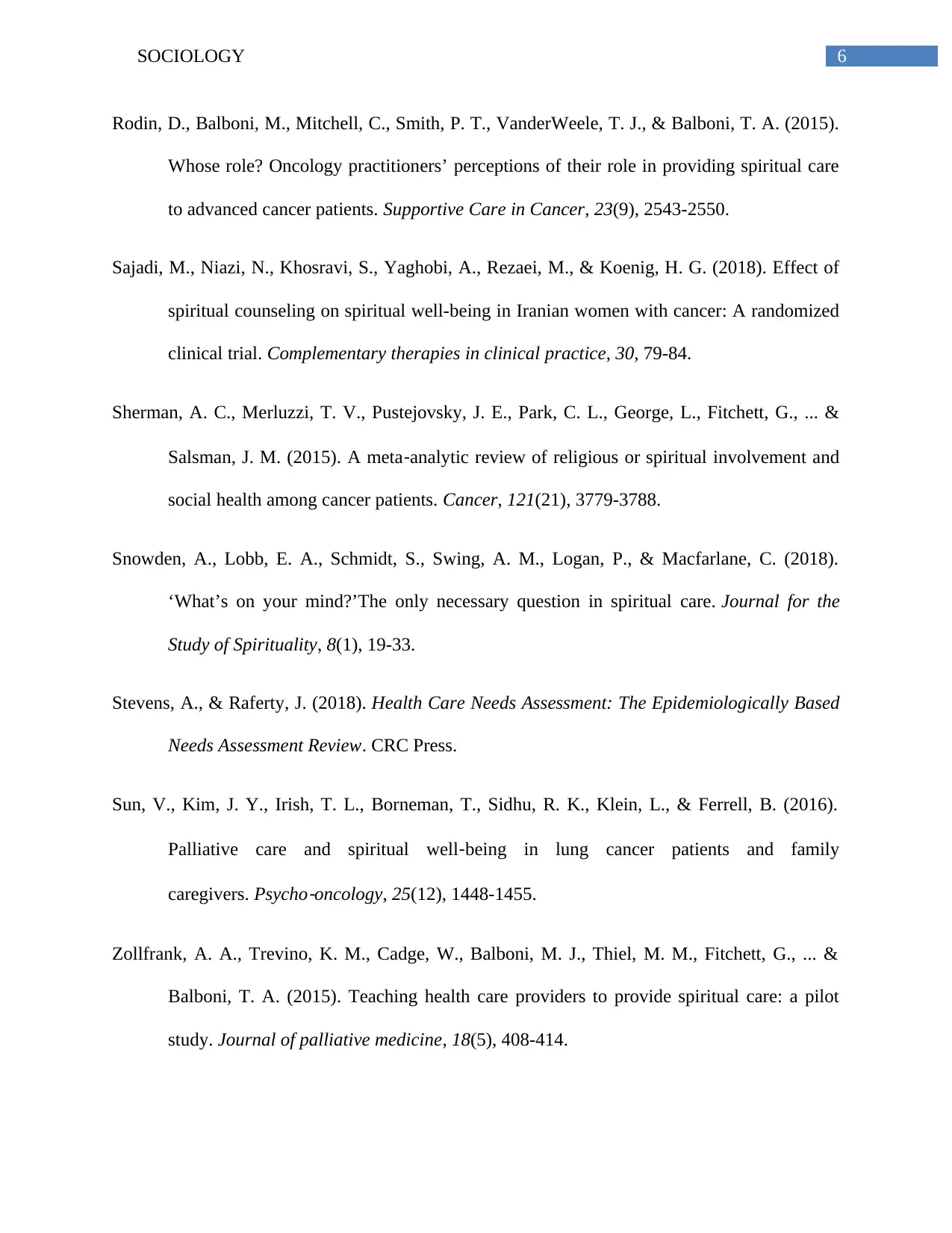
6SOCIOLOGY
Rodin, D., Balboni, M., Mitchell, C., Smith, P. T., VanderWeele, T. J., & Balboni, T. A. (2015).
Whose role? Oncology practitioners’ perceptions of their role in providing spiritual care
to advanced cancer patients. Supportive Care in Cancer, 23(9), 2543-2550.
Sajadi, M., Niazi, N., Khosravi, S., Yaghobi, A., Rezaei, M., & Koenig, H. G. (2018). Effect of
spiritual counseling on spiritual well-being in Iranian women with cancer: A randomized
clinical trial. Complementary therapies in clinical practice, 30, 79-84.
Sherman, A. C., Merluzzi, T. V., Pustejovsky, J. E., Park, C. L., George, L., Fitchett, G., ... &
Salsman, J. M. (2015). A meta‐analytic review of religious or spiritual involvement and
social health among cancer patients. Cancer, 121(21), 3779-3788.
Snowden, A., Lobb, E. A., Schmidt, S., Swing, A. M., Logan, P., & Macfarlane, C. (2018).
‘What’s on your mind?’The only necessary question in spiritual care. Journal for the
Study of Spirituality, 8(1), 19-33.
Stevens, A., & Raferty, J. (2018). Health Care Needs Assessment: The Epidemiologically Based
Needs Assessment Review. CRC Press.
Sun, V., Kim, J. Y., Irish, T. L., Borneman, T., Sidhu, R. K., Klein, L., & Ferrell, B. (2016).
Palliative care and spiritual well‐being in lung cancer patients and family
caregivers. Psycho
‐oncology, 25(12), 1448-1455.
Zollfrank, A. A., Trevino, K. M., Cadge, W., Balboni, M. J., Thiel, M. M., Fitchett, G., ... &
Balboni, T. A. (2015). Teaching health care providers to provide spiritual care: a pilot
study. Journal of palliative medicine, 18(5), 408-414.
Rodin, D., Balboni, M., Mitchell, C., Smith, P. T., VanderWeele, T. J., & Balboni, T. A. (2015).
Whose role? Oncology practitioners’ perceptions of their role in providing spiritual care
to advanced cancer patients. Supportive Care in Cancer, 23(9), 2543-2550.
Sajadi, M., Niazi, N., Khosravi, S., Yaghobi, A., Rezaei, M., & Koenig, H. G. (2018). Effect of
spiritual counseling on spiritual well-being in Iranian women with cancer: A randomized
clinical trial. Complementary therapies in clinical practice, 30, 79-84.
Sherman, A. C., Merluzzi, T. V., Pustejovsky, J. E., Park, C. L., George, L., Fitchett, G., ... &
Salsman, J. M. (2015). A meta‐analytic review of religious or spiritual involvement and
social health among cancer patients. Cancer, 121(21), 3779-3788.
Snowden, A., Lobb, E. A., Schmidt, S., Swing, A. M., Logan, P., & Macfarlane, C. (2018).
‘What’s on your mind?’The only necessary question in spiritual care. Journal for the
Study of Spirituality, 8(1), 19-33.
Stevens, A., & Raferty, J. (2018). Health Care Needs Assessment: The Epidemiologically Based
Needs Assessment Review. CRC Press.
Sun, V., Kim, J. Y., Irish, T. L., Borneman, T., Sidhu, R. K., Klein, L., & Ferrell, B. (2016).
Palliative care and spiritual well‐being in lung cancer patients and family
caregivers. Psycho
‐oncology, 25(12), 1448-1455.
Zollfrank, A. A., Trevino, K. M., Cadge, W., Balboni, M. J., Thiel, M. M., Fitchett, G., ... &
Balboni, T. A. (2015). Teaching health care providers to provide spiritual care: a pilot
study. Journal of palliative medicine, 18(5), 408-414.
1 out of 7
Related Documents
Your All-in-One AI-Powered Toolkit for Academic Success.
+13062052269
info@desklib.com
Available 24*7 on WhatsApp / Email
![[object Object]](/_next/static/media/star-bottom.7253800d.svg)
Unlock your academic potential
Copyright © 2020–2025 A2Z Services. All Rights Reserved. Developed and managed by ZUCOL.





